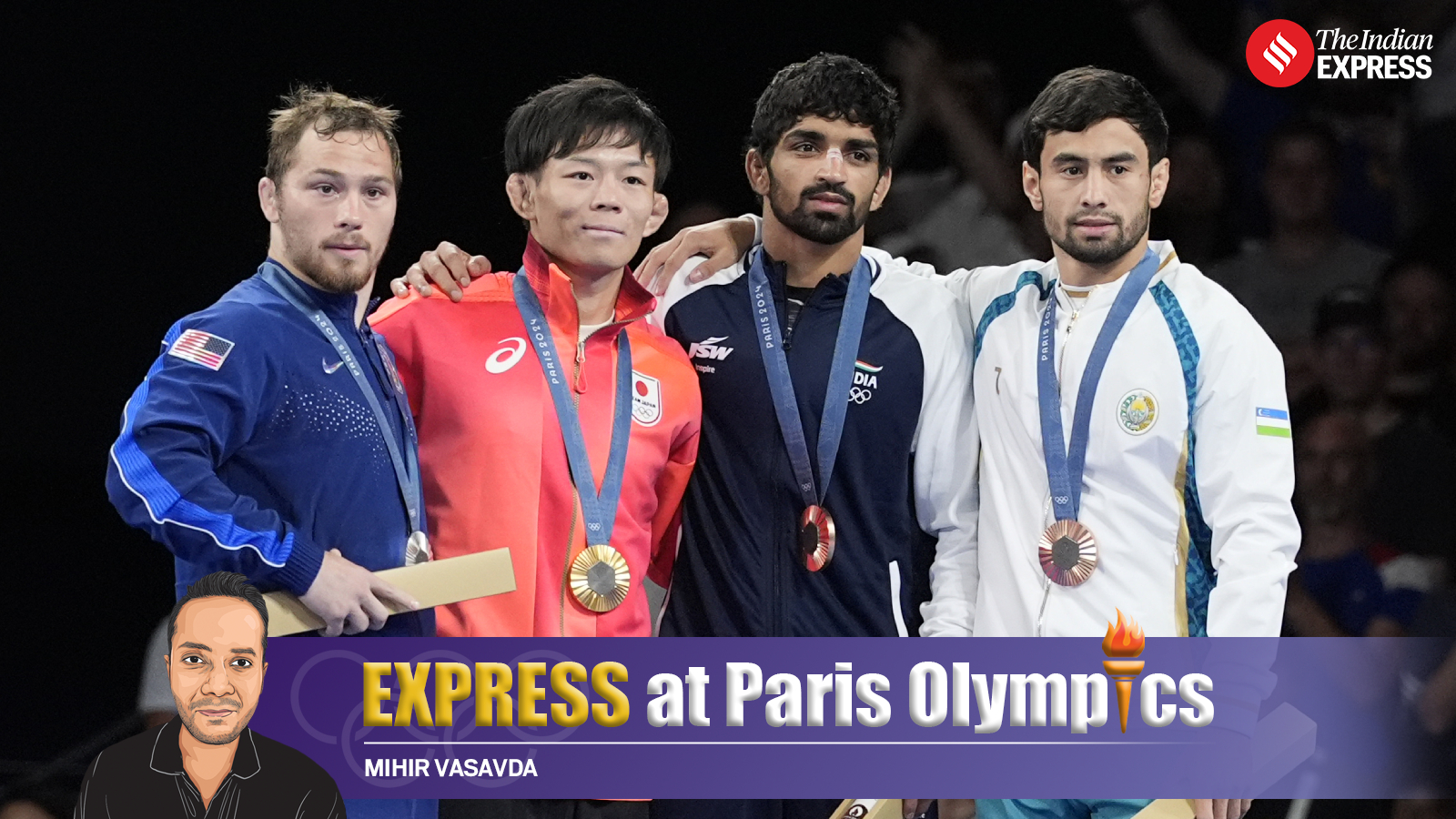Aman Sehrawat was just another wrestler when he crouched to grab Toi Darian Cruz’s right leg. By the time he got a tight grip, twisted it mercilessly and slammed the Puerto Rican on the mat, Aman Sehrawat was an Olympic medallist.
Continuing the tradition of an Olympic medal in wrestling, the 21-year-old clinched a bronze to take India’s tally at the Paris Olympics to six. This was also a wrestling medal in the fifth straight Olympics for India, a run that began with Sushil Kumar in 2008. He might have stepped on the mat on Friday evening but Aman Sehrawat’s actual bout took place the night before – with himself.
Before it ended with a sense of relief and happiness, Friday morning for the wrestling fraternity began with a feeling of residual dread. Aman Sehrawat returned to the Athletes Village Thursday night nearly a kilo-and-a-half over his competition weight of 57. This was normal, but Vinesh Phogat’s unfortunate fate a couple days ago led to slight anxiety.
And it wasn’t just the case of Phogat that played on their minds. Alireza Sarlak, the 2021 world championship silver medallist in the 57-kg class, had failed to make weight before the preliminary rounds on Thursday. That, in a way, was beneficial for Sehrawat who could have faced the Iranian for a medal depending on how the draw would have played out.
Unsurprisingly, there were a few jitters even though the weight he added was ‘normal.’ “After his semifinal ended, Aman had put on 1.5 kg weight,” India coach Virender Dahiya said. “It is natural for every wrestler. He did some mat training for 1.5 hours. Then at around 12.30 am, we made him hit the gym. He returned to his room at 4 am. At 4.15 am, his weight was all fine and under control. He then returned to his room and rested.”
Aman Sehrawat said: “It was tough to sleep. I just waited for time to weigh-in.”
He stood on the weigh scale at 7.15 am, and once it was confirmed he had made the cut, Aman had some protein for breakfast. Twelve hours later, at dinner time, he stepped on the mat and gobbled up a Puerto Rican.
He began nervously, conceding an early point and both wrestlers traded takedowns in the first period – both not bothering about defence. But once the nerves settled, Aman Sehrawat used strength, long reach and phenomenal upper-body strength to leave Cruz bruised and in tears. Aman Sehrawat won 13-5.
It was a trademark Sehrawat performance, whose upper-body strength, speedy leg work and undying appetite to attack have been spoken about highly at India’s greatest wrestling school, Chhatrasal.
This wasn’t the reason why he was enrolled into the academy. Sehrawat was admitted because he had nowhere else to go.
Aman Sehrawat was 10 years old when he lost his mother, who suffered from depression. A year later, he lost his father, who couldn’t bear the untimely demise of his wife. At 11, Sehrawat was orphaned. “This medal is for them,” Sehrawat said. “They don’t even know that I became a wrestler, that there’s something called the Olympics.” Back then, he didn’t know.
The 12-year-old stayed with his uncle but a few months later, he was brought to Chhatrasal, where, under a residential programme, young children were admitted and moulded into champion wrestlers. The coaches at the fabled academy did not check Sehrawat’s potential. They took him in out of sympathy, thinking if nothing, they would at least be able to provide the scrawny, under-weight and shy young boy with the bare minimum – two proper meals a day.
Aman Sehrawat, his coaches say, took to the new environment like a duck to water and submerged himself into the austere life of a wrestler: wake up before the sun would rise, climb ropes that are displaced from a giant tree, grapple in the mud and train on the mat. ‘Tapasya’ – penance – they call it here.
The kind of lifestyle that has produced world and Olympic medallists. Chhatrasal’s place in Indian wrestling is undisputed. Each of India’s male Olympic medallists in this century – Sushil Kumar, Yogeshwar Dutt, Bajrang Punia and Ravi Dahiya – have either spent their entire life, or at some point trained, at this North Delhi facility. It isn’t a place for the faint-hearted. However, the akhara produces battle-hardened wrestlers who not only dominate the domestic scene but also conquer the world.
Surrounded by greats, Aman Sehrawat has now become one. “He didn’t choose wrestling,” his coach Lalit Kumar said. “Wrestling chose him.” A product of circumstance he may have been, but Kumar said Sehrawat worked ‘longer and harder than most other trainees’ and put all eggs in basket, knowing he didn’t have anything else to fall back on if he failed in wrestling.
The World Cadet Championship bronze in 2018 was the first sign of promise, the Asian title in the same age group gave the coaches a reassurance of his abilities. And when he won the Under-23 Asian and World titles in 2022, they had little doubt that Sehrawat would go on to ‘do something big’ in Paris.
It wasn’t what Aman Sehrawat hoped, but ‘this was something to build on.’ “I came here hoping for a gold medal. But this bronze gives me a base for Los Angeles. Sushil pehelwan got two medals, so I too can get two or three medals.”



